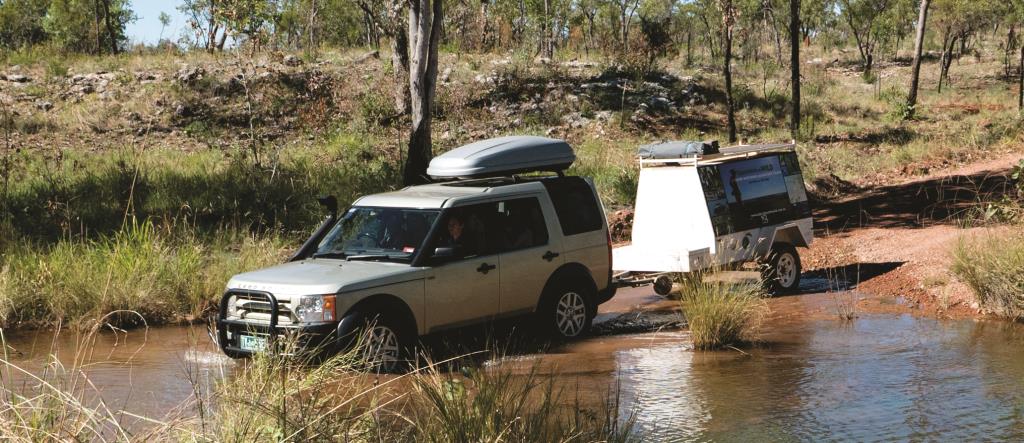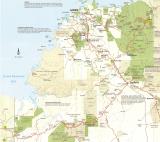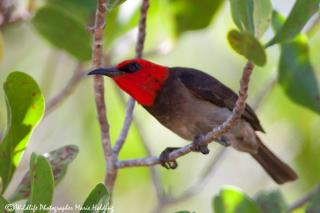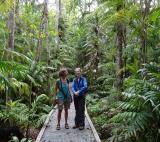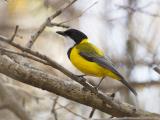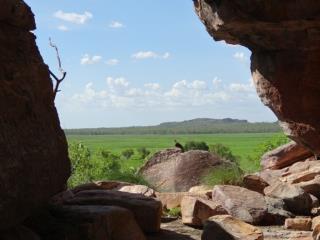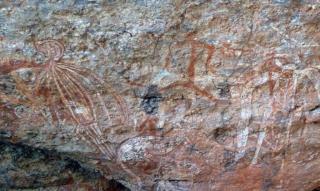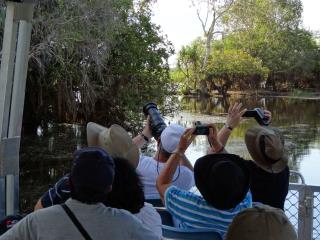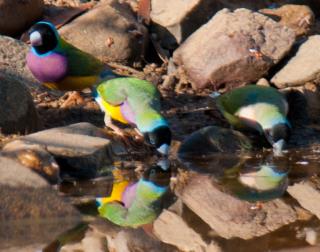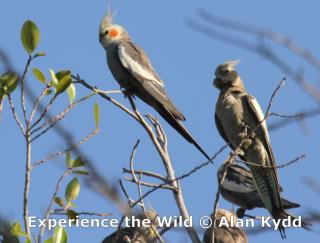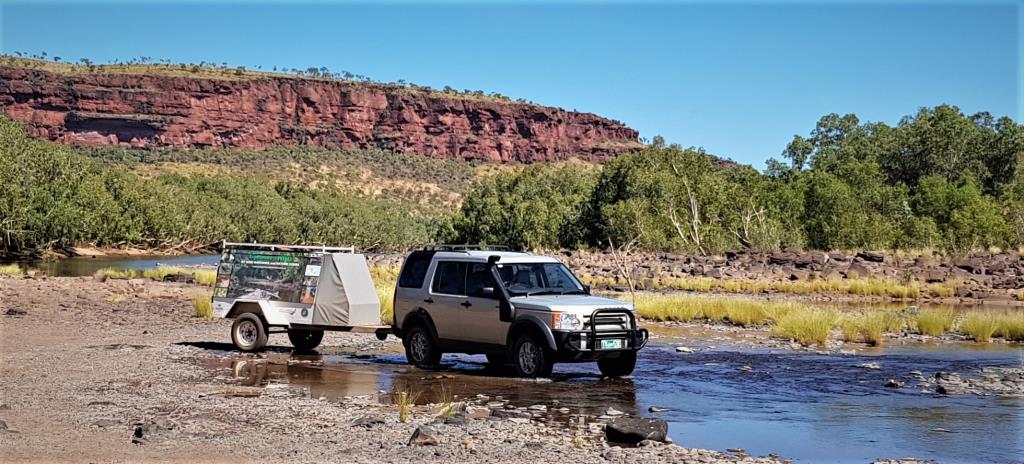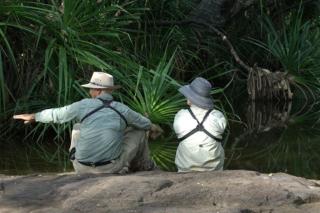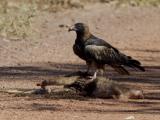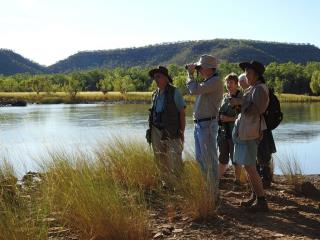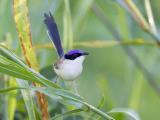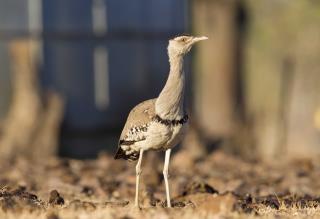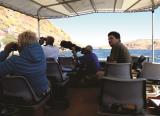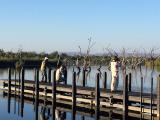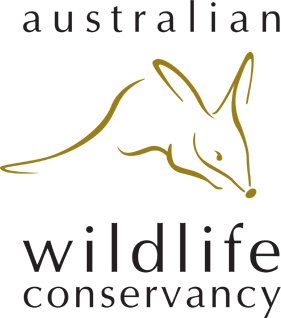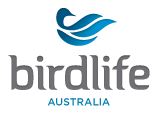Best of Top End Birding
Nine day's birding around Darwin, Mary River, Kakadu, Pine Creek, Katherine, Timber Creek, and Kununurra
-
Nine day, eight night tour starting with prime birding locations around Darwin's mangroves, monsoon forests and parklands, then Mary River National Park and the famous Kakadu National Park. We continue on through open savannah country to Pine Creek and Katherine. Then we follow the Victoria River through wide open plains and rugged escarpment ranges to Timber Creek. From there we explore Keep River National Park on the WA border before crossing into WA for the 5 hour Lake Argyle Birdwatching Cruise. We birdwatch around Kununurra and the tour finishes with a one hour flight from Kununurra to Darwin (not included in the cost). Total distance covered - 1600 kilometres. See map.Map showing the route we take on the 'Best of Top End Birding' tour. The numbers signify our location for each night. (photo copyright map Tourism NT)
- Key species - Gouldian Finch, Yellow-rumped and Pictorella Mannikins may be seen at various locations between Darwin and Timber Creek. Hooded Parrot, Northern Rosella, Red-winged Parrot, Cockatiel, Red-tailed Black Cockatoo, White-quilled Rock-pigeon, Buff-sided Robin, Partridge Pigeon, Purple-crowned Fairywren, Black-tailed Treecreeper and Sandstone Shrike-thrush. Red Goshawk, Black-breasted Buzzard. Kakadu escarpment endemics such as Chestnut-quilled Rock-pigeon, White-lined Honeyeater and Banded Fruit-dove. The Argyle birdwatching cruise should give us sightings of Yellow Chat, Long-toed Stint, White-quilled Rock-pigeon and other special species!
- Will this tour suit me? All accommodation is in comfortable air-conditioned rooms with ensuites. A (cheaper) 'thousand star' camping option is also available. We start before dawn and stop for a bush breakfast at beautiful locations surrounded by birdlife at its busiest. Lunch is enjoyed out in the field and dinners are a la carte menus at resorts or restaurants. Groups are small, with a maximum of only 6 enthusiastic fellow birders.
- Cost - $4995 per person twin share (single supplement $875).
- 2021 dates - August 23-31 (fully booked)
- 2022 dates - August 29 - September 6
- Book This Tour - Click here to book this tour
- Kununurra to Darwin extension will return you back to Darwin, calling in to some very special locations not visited on the first trip. The reverse trip runs September 1-4, 2021. Four day extension is $1975 per person twin share. See details here. Taking this option gives you a 13 day unforgettable immersion in Top End wildlife, landscapes and culture! Total cost for the 13 day trip is $6970 (single supplement $1240).
"A month has gone by since our great 8 day trip with Mike, and we are still talking about it. Hundreds of photos to go through (many to be deleted) but our special photos are of birds new to us. We travelled with a trailer (really a kitchen) and Mike knew where everything was. Bush breakfast with the birds was perfect, much better than eating before we went out. We had breakfast and lunch down to a tee, more time for bird watching. The whole trip was a wonderful experience made even better by our fun travelling companions."
Robin and Rupert
Victoria, Australia
September 2015
See Margaret Lacey's animated photobook from the September 2015 trip here. To find out more about Kakadu National Park and prepare yourself for a Kakadu tour, watch and enjoy these one hour ABC documentaries Episode 1, Episode 2, Episode 3, Episode 4
Itinerary
DAY 1 - DARWIN to MARY RIVER
Pick up from your Darwin accommodation - 6.30am
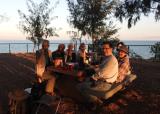
We start off with a bush breakfast at East Point, overlooking rocky shoreline with shorebirds while bushbirds come to a nearby leaky tap to drink.
After breakfast we walk through monsoon forest in search of the endemic Rainbow Pitta, Rose-crowned Fruit-Dove, Varied Triller and Brown Whistler.
We take the boardwalk that goes right through the mangroves to the mudflats, with a pleasant landing that allows us to sit, listen and observe while various waders, Red-headed Honeyeaters, Broad-billed Flycatchers, Collared Kingfishers, and others come into sight. After visiting some savannah woodland habitat for Forest Kingfisher, Double-barred and Long-tailed Finch, Red-tailed Black Cockatoo, Spangled Drongo and others, and then we head out to the wetlands of Fogg Dam Conservation Reserve.
The 60 kilometre drive out to Fogg Dam gives us the opportunity to spot various raptors, kingfishers and the Blue-winged Kookaburra, as well as see a blend of savannah woodland and paperbark forest habitats. At Fogg Dam, the Pandanus lookout is a great place to eat our picnic lunch overlooking the floodplain. The spotting scope is set up and we pick out Magpie Geese, Intermediate Egret, Little Egret, Great Egret, Cattle Egret, Pied Heron, Royal Spoonbill, Little Black Cormorant, White-browed Crake, Black-necked Stork and sometimes Brolga from here. Whistling Kites and often a White-bellied Sea-eagle soar overhead. Crimson Finch, Rufous-banded Honeyeater, Lemon-bellied Flyrobin, Rose-crowned Fruit-Dove, Forest Kingfisher, Sacred Kingfisher and Paperbark Flycatcher are some of the species that occupy the bush on the edge of the floodplain and are often seen in the carpark area. Estuarine Crocodiles, Gilberts Dragon’s, Yellow-spotted Monitors, Northern Long-necked Turtles and Common Tree Snakes may be seen here.
Then we explore the Waterlilies walk which takes us along the fringe of wetland, through paperbark forest. We often see Rainbow Pitta, Brown Whistler, Arafura Fantail and Shining Flycatcher.
We stop at Adelaide River Bridge and search for Mangrove Golden Whistler then continue on to the Mary River Wilderness Retreat and compare notes on sightings for the day. Listen for Bush Stone-curlew, Tawny Frogmouth and Barking Owl at night.
Distance covered for the day - 150 kilometres.
Dinner and accommodation is in a comfortable, air-conditioned Bush Bungalow at Mary River Wilderness Retreat.
DAY 2 - MARY RIVER to KAKADU
We leave early for Kakadu National Park, stopping at the Mamukala bird hide. We have a bush breakfast and then do the four kilometre loop walk. Then we visit the hide.
After a picnic lunch at Ubirr, we explore the Manngarre Monsoon Forest walk, Cahill’s Crossing and Bardedjilidji Sandstone Escarpment walks, searching out some Kakadu escarpment endemics such as Chestnut-quilled Rock-pigeon and White-lined Honeyeater. Other species on our target list today are Partridge Pigeon, Rainbow Pitta, Shining Flycatcher, Northern Fantail, Arafura Fantail, Black and Little Red Flying Fox and Wilkin's Rock Wallaby. We take in some spectacular ancient rock art and a magnificent view across the Nadab Floodplain.
At Cahill’s Crossing we may see large Estuarine Crocodile's gathering and positioning themselves to catch barramundi as small bait fish swarm upstream with the incoming tide.
We leave Ubirr and head to our accommodation at Jabiru.
Distance covered for the day - 230 kilometres.
Dinner and bird call at the resort and possibly some nearby nightspotting for nocturnal species. Accommodation at Kakadu Lodge, Jabiru
DAY 3 - EXPLORE KAKADU
Early morning bush breakfast at Anbangbang Billabong. Then we do the 2.5 kilometre circuit walk at Burrunggui rock. Here there is more ancient Aboriginal rock art, and more endemic species such as Banded Fruit-dove, Sandstone Shrike-thrush, Sandstone Helmeted Friarbird and Black Wallaroo. Other species we will look for include Emerald Dove, Northern Rosella, Partridge Pigeon and Spangled Drongo.
We have a picnic lunch at Mardagul, near Cooinda. We do the short Mardagul Billabong walk and then visit the Warradjan Cultural Centre which offers an amazing insight into local Aboriginal culture and history. There is also a well stocked cultural and natural history bookstore and authentic souvenir shop.
At 4.10pm we depart for the famous Yellow Waters cruise. From the comfort and safety of an open sided, covered vessel we are likely to see our four species of Egret - Great, Intermediate, Little and Cattle as well as Black-necked Stork, Brolga, Radjah Shelduck, Wandering and Plumed Whistling-ducks, Green Pygmy-goose, Pied Heron, Nankeen Night-heron,
Comb-crested Jacana, Royal Spoonbill, Azure Kingfisher, Little Kingfisher, Buff-sided Robin as well as many large Estuarine Crocodiles. What is particularly amazing about this cruise, is that, because it runs four times a day, every day of the year, the birds and crocodiles are so accustomed to it that they continue on in their natural behaviour completely undisturbed by the presence of the boat.We pause on sunset and take a few minutes to absorb the splendour of the location as the sun dips below the horizon, often with hundreds of birds flying overhead to their night roosts.
Distance covered for the day - 100 kilometres.
Dinner and bird call at Gagadju Lodge. Accommodation at Cooinda
DAY 4 - KAKADU to PINE CREEK
We depart Jabiru early via Kakadu Highway and have a bush breakfast beside the upper reaches of the South Alligator River.
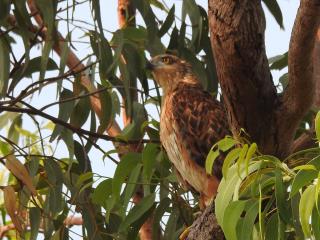
We explore some more areas of southern Kakadu on the way out. The country changes and so do the bird sighting possibilities. We look out for Australian Bustard in flat open plains. We visit Gunlom and search for more endemic species while enjoying magnicent scenery and perhaps even a swim in the natural infinity pool above the falls. We explore an area where a pair of Red Goshawks have recently bred and stop at another location where Silver-backed Butcherbirds are reliable and then continue on to Pine Creek.
We explore the very birdy town of Pine Creek, which often has Hooded Parrots, Red-winged Parrots, Grey-crowned Babblers, Great Bowerbirds (and active bowers) and many other species, coming in to drink at sprinklers in the town and roosting in trees and on powerlines.
Distance covered for the day - 240 kilometres.
Dinner, bird call and accommodation at Pine Creek.
DAY 5 - PINE CREEK to VICTORIA RIVER ROADHOUSE - breakfast with Gouldian Finches!
We check out early from our accommodation at Pine Creek and head down to a waterhole on the Fergusson River. Here we enjoy a bush breakfast while watching birds coming to drink from a creek. Here there are some reliable areas for Gouldian Finch and Hooded Parrot! Other target species here are Banded Honeyeater, Bar-breasted Honeyeater, Rufous-throated Honeyeater, Cockatiel, Red-winged Parrot, Varied Lorikeet, Great Bowerbird, Grey-crowned Babbler and sometimes Budgerigar.
We then head south, bird around the Katherine township and have a picnic lunch at Nitmiluk National Park. Great Bowerbirds, Blue-winged Kookaburras and
Apostlebirds are regulars at the picnic spot.We continue on to Victoria River Roadhouse, stopping to bird at some locations along the way. Near the Victoria River Roadhouse we explore the river's edge for Yellow-rumped Mannikin and Purple-crowned Fairy-wren.
Distance covered for the day - 290 kilometres.
Dinner, birdcall and accommodation at Victoria River Roadhouse.
DAY 6 - VICTORIA RIVER ROADHOUSE to TIMBER CREEK - real outback country!
We have a bush breakfast at Dingo Springs. We continue west where the habitat changes dramatically as we travel through magnificent escarpment country, trees here include the amazing Boab and Nutwood. Raptors including Wedge-tailed Eagle, Black-breasted Buzzard, Spotted Harrier and Square-tailed Kite are often seen here. There are records of the rare Grey Falcon in the area too.
There are many waterholes in otherwise dry creek beds that make this time of the year so productive for bird watching. We leave Victoria Highway and travel down some of the tracks that take us to some great little birding spots in beautiful rugged settings. Star, Zebra and Crimson Finches, Crimson Chat and Red-browed Pardalote are among the targets here. Flocks of Cockatiels and Budgerigars are sometimes seen overhead.
We have lunch at Policeman's Point and return to our accommodation for a siesta. At around 4pm we explore some areas close to Timber Creek in search of finches and the Purple-crowned Fairywren. Gouldian and Star Finches, Pictorella and Yellow-rumped Mannikins, Purple-crowned Fairy-wrens, Spinifex Pigeon, Diamond Dove, Yellow-tinted and Black-chinned Honeyeaters are among the species we may see here. After exploring some walks here we go to the airfield nearby where we have more opportunities to see these species. Painted Finch, Crimson Chat and Inland Dotterel have been seen here too.
Distance covered for the day - 170 kilometres.
Bird call and dinner at the escarpment lookout and accommodation at Timber Creek.
DAY 7 - TIMBER CREEK to LAKE ARGYLE
We check out early and have a bush breakfast at old Victoria River crossing.
On the WA border is our western most park - Keep River National Park. Here we search for Spinifex Pigeon, White-quilled Rock-Pigeon and Sandstone Shrike-thrush, before continuing on across the border into WA.
Distance covered for the day - 245 kilometres.
Bird call, dinner and accommodation at Lake Argyle.
DAY 8 - LAKE ARGYLE and KUNUNURRA
We meet the boat at 5.30am (actually 7am NT time) for the five hour birdwatching cruise on Lake Argyle. Lake Argyle is Australia's largest expanse of fresh water with a surface area of over 1000 square kilometres, and is a Ramsar site.
Breakfast is served on the boat at a specially chosen location which allows for good birding as we eat. Here we usually see a variety of crakes and rails as well as other waterbirds.
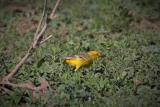
Other unique birds we hope to see on this cruise include Yellow Chat, Sandstone Shrike-thrush, White-quilled Rock-pigeon, Pictorella Mannikins, Australian Pratincole and a great variety of waterbirds and shorebirds. Short-eared Rock Wallabies, Euros and Freshwater Crocodiles are often seen here too.
We explore areas between Lake Argyle and Kununurra looking for Gouldians, Star Finches, Yellow-rumped Mannikins and Chestnut-breasted Mannikins.
Distance covered for the day - 100 kilometres.
Dinner and bird call and accommodation at Lakeside Resort, Kununurra.
DAY 9 - KUNUNURRA and return to DARWIN
We explore areas around Kununurra where Australian Reed Warbler, finches, honeyeaters and waterbirds are found. We have a group lunch and bird call at a restaurant in Kununurra. We say goodbye to people finishing the tour here and see them off at the airport for a 3.40pm departure.
Distance covered for the day - 40 kilometres.
Anyone continuing on with the Kununurra to Darwin extension by road can have a relaxing afternoon in readiness for another early start the next morning. Please click here for the Kununurra to Darwin Extension return trip itinerary.
Download a printable copy of this itinerary
Please Note: The above itinerary is based on the outcomes of many previous tours to the areas described. Each season is different and as various wildlife observing opportunities arise and depending on the preferences of the group, adjustments will be made.
Inclusions - Accommodation, all with queen bed and single configurations, airconditioning and ensuite - one night at Mary River Wilderness Retreat, two nights accommodation at Kakadu Lodge, Jabiru, one night at Pine Creek, one night at Victoria River Roadhouse, one night at Timber Creek, one night at Lake Argyle and one night at Kununurra. Yellow Waters Sunset Cruise, Lake Argyle Birdwatching Cruise, bush breakfasts, picnic lunches and main meals, Kakadu Park entry fees. Cold water, tea and coffee and refreshments available at all times. Forty page booklet - combined checklist, itinerary, map and journal.
Exclusions - Pre and post tour accommodation, alcoholic drinks, purchases of a personal nature such as souvenirs, etc. Flight from Kununurra to Darwin. Airnorth flies to Darwin everyday and twice on Thursdays. They also fly to other regions.
Group Tour - Maximum six people, $4995 per person twin share, single supplement $875. Camping option, $3295 per person.
Please Click Here to Check Availability and Book Now
All prices are in Australian dollars. Please click here for conversion to your currency.
Booking Procedure - You can book directly using our secure online booking site by clicking here. Payment options are Visa, Mastercard, Paypal or Bank Transfer. A 20% deposit secures the booking, the balance is due 30 days prior to start of tour. Please feel free to contact us if you have any queries regarding the tour.
Further Information - Visit our FAQ page to learn more about how our tours run. Visit our 'Darwin Accommodation' links page to find some helpful suggestions for pre and post tour arrangements. Our Terms and Conditions document outlines our cancellation and refund policy. Email enquiries@experiencethewild.com.au or ring Jenny or Mike on 0400 404 058
Birdwatching Ethics
Most birdwatchers are cognizant of the needs of birds and avoid causing any undue stress to their avian subjects. We don't use playback to bring birds closer and we keep a respectable distance from nests. There are photos of birds at the nest on this website. These are taken from a reasonable distance with aid of powerful zoom lenses and in most cases, from an established pathway. Also, we don't chase or deliberately flush birds. Quietly stalking them will yield better results, but even this can be interpreted by birds as predatory behaviour. The most satisfying close encounters are had when birds move in to range of their own volition when we wait patiently in the one location. We never place food to bait birds to come in to range. Guides have the benefit of an intimate familiarity with local species and habitats and can set you up to get great results without resorting to questionable practises. Guests are encouraged to speak up if they see any situation that could be detrimental to birds or habitat while on tour.
